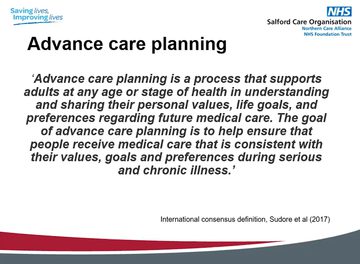Before you watch this webinar
Enhancing your learning experience begins with understanding you better. Collecting data enables us to tailor our educational content specifically for our audience. Discover more about how we handle your information in our Privacy Policy.
Event
Advance Care Planning in patients with Parkinson's
Our sponsor

Watch the webinar to get hints and tips on practical ways to commence conversations and put in place Advance Decision with your Parkinson's patients.
Objectives:
- The delegates will learn what an Advance Decision is.
- When and who should be part of the conversation and where is this documented.
- Experts will discuss what good practice looks like in end of life conversation in Parkinson’s Disease.
CPD accreditation
'Advance Care Planning in patients with Parkinson's' has been approved by the Federation of the Royal Colleges of Physicians of the United Kingdom for 1 category 1 (external) CPD credit(s). Please note CPD Federation approval does not include satellite symposia sessions. To claim the credit please email events@neurologyacademy.org.
Presentation slides
Summary
Over 200 people joined the live webinar on advance care planning in Parkinson's chaired by interim head of Parkinson's Academy and nurse by background Daiga Heisters. Featuring Dr Tim Jackson, consultant in palliative medicine, and consultant geriatrician Dr Ed Richfield, founding Faculty for Palliative Care Academy.
Tim Jackson outlined his element of the session, discussing advance care planning in general, the 'who, what and when' of it, and examples of good practice before addressing specifics such as advanced decisions to refuse treatment, advance directives and special considerations in Parkinson's and related conditions. Ed shared his own considerable experience in responding to questions from attendees and discussing elements of practice and planning around advanced care in Parkinson's.
Advance care planning and preparing for the end of life
Beginning with a definition of advance care planning from NICE (2019), Tim shared a quote:
'Advance care planning can make the difference between a future where a person makes their own decisions and a future where others do.'
He was clear that advance care planning (ACP) refers not only to medical care but a holistic, values-based view of care and of their personal preferences (fig 1).

Figure 1: International consensus definition of advance care planning
Tim highlighted the Dying Matters campaign, and their encouragement to discuss dying and death with loved ones, and to consider our own preferences around the end of life. When considering discussions around advance care planning, Tim pointed out the range of topics, from practical and legal matters, to preferences around place of care, to values or medication preferences and was clear that the discussions are not 'just about death' or medical choices. Tim shared the 'bucket list' of a young man who was diagnosed with bowel cancer as a positive example of the far wider preferences and values to consider when thinking about advance care plans.
He noted that, as a population, British people are not particularly prepared to have a good death with only 36% having a written will and only 6% having written wishes or preferences about their future care should they be unable to make decisions for themselves.
Tim shared that whilst the majority of people state a preference to die at home, only half actually did, with one third dying in a hospital. He highlighted that, across neurological conditions, the majority of deaths take place in a hospital rather than at home or in another care setting, unlike people with cancer who are more likely to die in their own homes.
Parkinson's and ACP
In terms of people with Parkinson's, Tim shared various studies around ACP and their findings, noting that:
some form of planning or discussion has often taken place (75% of cases although the term 'advance care planning' was not necessarily familiar) and 69% were interested in learning more about ACP but that knowledge of some of the tools around ACP such as ADRTs were less known about (Chum 2021).
most of the individuals with Parkinson's felt that these discussions were not needed 'yet' whilst family members felt that they would be helpful (Chum 2021).
communication is often not well done, when ACP takes place (Nimmons 2020).
patients felt that ACP was either prompted by their own questioning or as a result of a crisis (Nimmons 2020).
Barriers to successful or timely discussions, as found in a qualitative study that Tim carried out, were found to include:
many tools are available but there is not a systematic approach to using these
lack of confidence amongst staff,
lack of clear progression of a condition,
cognitive impairment in patients,
limited time in clinic
patients not wishing to have those discussions.
Regarding when to talk about advance care planning, Tim suggested that there are elements of these discussions which should take place throughout a person's life.
'I think that advance care planning doesn't necessarily need to be reserved to the end stages of Parkinson's, that actually, different elements of discussions can be tailored to the individual at each and every stage of the condition.'
Dr Tim Jackson
However, he also referred to the Gold Standards Framework's prognostic indicator and the question 'would you be surprised if this person died in the next 12 months?' If the response is 'no', these discussions are absolutely necessary.
He encouraged people to consider cognitive impairment, with up to 80% of people with Parkinson's likely to experience this in some form, and the potential to develop Parkinson's disease dementia or Lewy body dementia also increased.
Tim talked about the variety of people who may be involved, from a one to one discussion between a patient and a clinician, to involving family members or friends, liaising with chaplaincy teams or, occasionally, solicitors.
He also shared specific elements of advance care planning that may be particular to people living with Parkinson's (fig 2).

Figure 2: Potential ACP discussion topics for people with Parkinson's
Tim talked about advance directives or 'living wills' and noted that whilst not legally binding, these are positive general statements of wishes related to what a patient would like. By contrast, an advance decision to refuse treatment (ADRT) is legally binding and must be witnessed and specific to the situation, and needs to be made whilst someone has capacity and after extensive discussions with their healthcare professional. However, Tim noted that the specific nature of ADRTs mean that he tends towards using Lasting power of attorney (LPA) more often which can also include decisions around life-sustaining treatments.
Frailty scores and ACP
Ed Richfield responded to a question around frailty scores are useful in advance care planning. Parkinson's is essentially a series of frailty syndromes and I feel that frailty scores would be too blunt a tool in ACP although it might be a useful red flag, or to screen patients to assess whether they would be appropriate for palliative and supportive care.
Guidance, tools and supportive information
Tim shared a range of national guidance and various local documents including a reasonably new form called the Respect form (fig 3) which can all be supportive in optimising advance care planning and palliative care.

Figure 3: Respect form to support ACP and palliative discussions
Some of the guidance available, some aimed at professionals, others at people with Parkinson's, include:
Parkinson's UK's 'Preparing for end of life'
Dying Matters, 'Planning for your future care: a guide'
Tim discussed the electronic ACP record 'Coordinate my Care' and noted that those who had an ACP through this tool were significantly more likely to die at home than those without (fig 4).

Practical considerations
Tim is clear that having a conversation about ACP needs to be a calm, quiet and comfortable setting and that the individual needs to feel able to end the discussion at any point they wish.
He gave examples of how to open the conversations, with clarity around this being a series of discussions, some of which may seem less important to clinicians but may be very important to them.
He offered different introductions, including giving an overview of some of the topics before asking 'Would you like to talk about anything related to any of this today?'
He shared the importance of documenting the conversations in letters to the GP or patient under a clear heading, and following this up in advance care planning documents.
Tim and Ed then responded to a range of questions and discussed various topics, including:
Is ACP in Parkinson's an area for research
The difficulties It can be difficult to have these discussions in an emergency situation
The challenges that these discussions can cause within a therapeutic relationship
Who ought to be the lead for the discussion and should this be defined in any way
Our sponsor

'The things you can't get from the books'
Parkinson's Academy, our original and longest running Academy, houses 23 years of inspirational projects, resources, and evidence for improving outcomes for people with Parkinson's. The Academy has a truly collegiate feel and prides itself on delivering 'the things you can't get from books' - a practical learning model which inspires all Neurology Academy courses.

